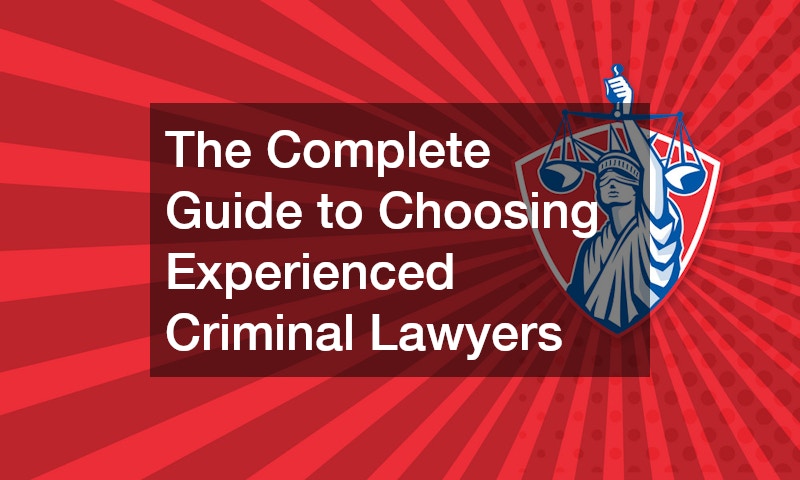When facing criminal charges, the right legal representation can make an immense difference in the outcome of your case. Navigating the complex world of criminal law requires the expertise of experienced criminal lawyers who are adept at maneuvering through legal intricacies. In this guide, we will delve into the essential aspects of finding and choosing seasoned criminal attorneys who can effectively protect your rights and interests.
From understanding the importance of experience to considering reputation and communication skills, this article will provide you with a comprehensive framework to make an informed choice.
Understanding the Importance of Experience
Experience is arguably the most crucial factor to consider when choosing a criminal lawyer. Experienced criminal lawyers have likely encountered a wide array of cases and legal challenges, enabling them to devise effective strategies tailored to each client’s unique situation. Furthermore, familiarity with courtroom procedures and jurisdictional nuances often grants experienced lawyers a significant advantage. They are well-versed in identifying potential weaknesses in the prosecution’s case, which can be critical in negotiating plea deals or achieving favorable verdicts. An attorney’s past experience serves not only as a testament to their capabilities but also as reassurance to clients during high-stress legal proceedings.
Beyond trial experience, seasoned lawyers often possess in-depth knowledge of local court processes and established professional relationships with judges and prosecutors. This network can facilitate smoother negotiations and strategic advantages that inexperienced lawyers might lack. Additionally, seasoned attorneys are typically more efficient in their preparations, ensuring that all documentation and evidence are meticulously handled. Their comprehensive understanding of legal precedents and case law allows for innovative legal solutions that can be pivotal in complex cases. Therefore, ensuring your lawyer holds substantial experience in criminal law is an indispensable consideration when seeking legal representation.
Finally, experienced criminal lawyers are proficient in stress management and crisis communication, skills that are critical in maintaining composure during proceedings. Their ability to anticipate challenges and develop contingency plans reflects the depth of their experience. Clients benefit from their ability to provide clear explanations of the legal process, thus reducing anxiety and confusion. This level of professionalism builds trust and confidence, creating a more successful attorney-client relationship. Selecting an attorney with robust experience is, therefore, vital to navigating the often tumultuous waters of criminal defense.
Assessing the Lawyer’s Reputation
A lawyer’s reputation provides insight into their legal acumen and ethical standards, making it a significant factor in your choice. Experienced criminal lawyers who are well-regarded often have a history of successful case outcomes and satisfied clients. Evaluating testimonials, reviews, and peer endorsements on platforms such as law directories can offer valuable perspectives. An attorney with a sterling reputation is more likely to be taken seriously by opposing counsel and judges, potentially influencing your case’s proceedings favorably. Thus, thoroughly researching the reputations of potential lawyers is a prudent step in ensuring you choose a competent representative.
Additionally, a lawyer’s professional standing within the legal community can indicate their commitment to ethical practice and continuous learning. Membership in esteemed legal associations reflects a desire to stay updated with legal advancements and maintain high ethical standards. Such affiliations often require adherence to specific codes of conduct, providing further assurance of the attorney’s reliability. Engaging a lawyer with a good reputation can also grant you peace of mind, knowing that your legal issues are handled by someone respected in their field. Consequently, the reputation of your attorney acts as a crucial component in selecting the right legal partner.
Furthermore, reputation often correlates with an attorney’s approachability and dedication to client service. Lawyers known for their integrity typically prioritize transparent communication and client-centric services. This assurance of quality can lead to more effective collaboration and trust, particularly important in high-stakes criminal cases. A positive reputation also signals the attorney’s efficacy in managing cases, anticipating issues, and achieving optimal results. By carefully considering the reputation alongside other factors, clients are more equipped to make informed decisions and secure proficient legal counsel.
Evaluating Communication Skills and Client Rapport
Effective communication is a cornerstone of a successful attorney-client relationship. Experienced criminal lawyers who communicate clearly and openly can significantly ease the legal process for their clients. The ability to explain complex legal terms in an understandable manner empowers clients to make informed decisions throughout their case. Regular updates and prompt responses to client inquiries help maintain transparency and trust. Ensuring your lawyer prioritizes open communication can alleviate stress, allowing you to focus on the broader aspects of defending your rights.
In addition to verbal communication, assessing a lawyer’s listening skills is equally important. An attorney who actively listens is better able to understand their client’s concerns and adapt strategies to suit individual needs. This empathetic approach fosters a supportive environment where clients feel comfortable sharing pertinent details. Such openness can lead to comprehensive defense strategies that more precisely align with the client’s objectives. Hence, strong communication skills contribute significantly to an attorney’s effectiveness and the overall success of the legal process.


